Book contents
- Frontmatter
- Dedication
- Contents
- List of figures
- List of tables
- List of contributing authors
- Foreword
- Introduction
- 1 The virtuous circle of value creation in the sports industry
- 2 Value creation and performance criteria for sport entities
- 3 National context and profit strategy of the sport entity
- 4 Value creation in two of the most prestigious Spanish football clubs
- 5 The proto-image of Real Madrid
- 6 Value creation from the organizational structure of a sports entity
- Appendix I Why NGOs matter for the success of sporting events
- Appendix II Strategic evaluation of sponsorship and patronage
- Appendix III Structural characteristics of sport organizations
- Index
- References
2 - Value creation and performance criteria for sport entities
Published online by Cambridge University Press: 05 February 2014
- Frontmatter
- Dedication
- Contents
- List of figures
- List of tables
- List of contributing authors
- Foreword
- Introduction
- 1 The virtuous circle of value creation in the sports industry
- 2 Value creation and performance criteria for sport entities
- 3 National context and profit strategy of the sport entity
- 4 Value creation in two of the most prestigious Spanish football clubs
- 5 The proto-image of Real Madrid
- 6 Value creation from the organizational structure of a sports entity
- Appendix I Why NGOs matter for the success of sporting events
- Appendix II Strategic evaluation of sponsorship and patronage
- Appendix III Structural characteristics of sport organizations
- Index
- References
Summary
Introduction
Approached from the viewpoint of value creation two questions are addressed in this chapter:
(1) are sport-related businesses different from others?
(2) if so, how and in what way are they different?
To answer these questions we focus on the different dimensions inherent in sport-related business including historical, economic and social capitals. Different business models are analysed, and different football clubs are compared on the basis of different indicators. Stakeholder model is evaluated. Wrapping up the chapter we assess the way sport entities create value.
If generic business is about the capture and retention of customers, sport business is more difficult to define due to the different dimensions that coexist. Indeed, on top of selling season tickets, merchandising products or television rights, the sport entity has to face other dimensions that are not capitalistic activities (Shulman and Bowen, 2001).
In that sense, it is interesting to figure out if the development of sport activities has emerged as a consequence of professional underdevelopment or the emergence of a new performance model. The answer to this question is fundamental to determine how and where the creation of value comes from in sport activities.
- Type
- Chapter
- Information
- Value Creation and Sport Management , pp. 22 - 59Publisher: Cambridge University PressPrint publication year: 2010



